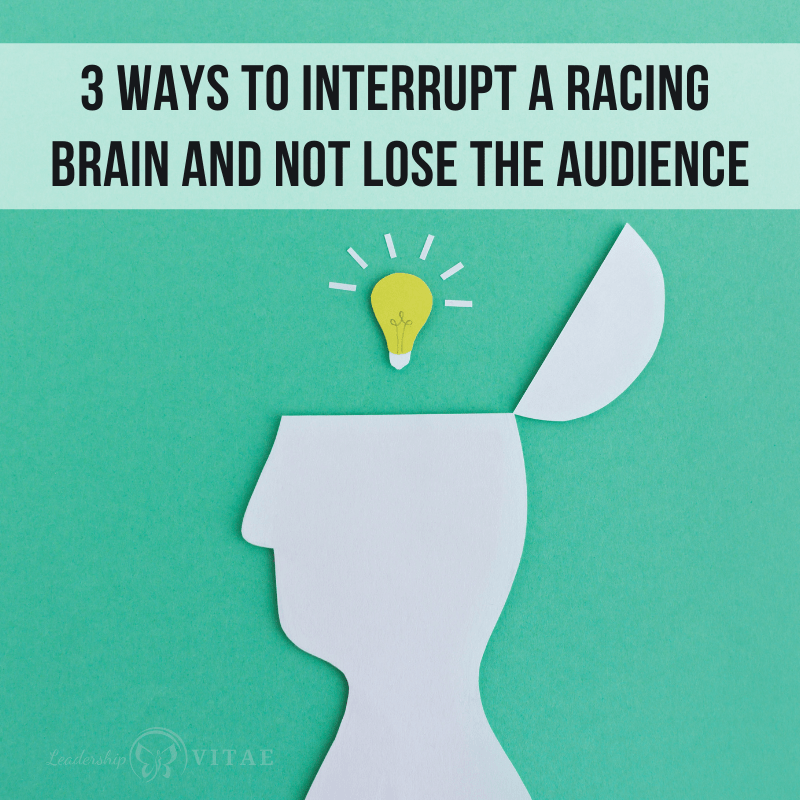
Our brains are these amazing supercomputers. Capable of processing innumerable data points simultaneously. Of generating new and innovative ideas or creating connections out of seemingly unrelated concepts.
The brain’s ability to find patterns, see old things in new ways, and soak up whatever we feed it amazing. When it’s working for us. But what about when it pegs out and just won’t slow down?
We may find ourselves in discussions with more thoughts than we can possibly express. Decisions where we have all these insights we wish everyone at the table knew. All the things in our head, just wanting to get out.
While it can be valuable to have such insights and knowledge readily available, there’s a downside too. If we let our brains race away, we can lose our audience. No matter how many ideas or arguments we have, if we can’t slow our minds down, it comes too much of a good thing and could have the opposite effect of our intentions.
What can we do if we find our minds racing away from us?
1. Write it down
Years ago, I started bringing a notebook to every meeting. I had my laptop, but paper and pen were my lifeline.
Every time something would pop up in my mind, I’d write it down. Rather than interrupt with the idea, I’d give it a written outlet. As the conversation progressed, if it was still relevant, I’d share.
Not every notion we have needs to be communicated. Not every argument or idea is necessary or relevant. The notepad served two purposes. One was to capture those notions, so they got out of my head. The other was to slow my brain down.
The physical act of writing helped me lower my energy level and slow my racing brain. It allowed me to be more present in conversations and mindful of what to share when.
Since the pandemic, I’ve developed quite the collection of notebooks, 3.5 cards, and post-it notes. My desk has an endless supply of materials to capture racing thoughts. Sometimes, they become relevant to the conversation. Others become writing ideas or topics for follow-on discussions. The rest? Fodder for the bin.
2. Soundboard in the safety zone
Sometimes we have so much energy around an idea, we just need to get it out. The only challenge is whether our current audience is the best group to receive it.
If we’re going into a discussion on a topic our brains are zipping around about like a pinball machine, it might be worth a quick detour.
Ahead of the discussion, find a safe place to get the energy out. If someone in our circle loves our passion and enthusiasm, they are a great one to reach out to. Ask for a few minutes to let loose and go!
With this approach, we can share our idea with whatever energy we have. Unload our endless points and reasoning. Then step back and decide what of that is the most relevant. Ideally our circle can help us narrow down all the points to the best handful.
Our enthusiasm may be overwhelming to others. We can have a million and one ideas or reasons or arguments to whatever. Most people don’t need that many. In fact, after the critical few, they start to feel bowled over.
Let’s imagine the connection between our brain and mouth to be a valve. In safe spaces, we can open it up wide and let it all out at once. Ideally there’s someone in our circle that can receive our energy and ideas without judgment.
This way, we release any pent-up energy ahead of time. We can turn the dial down and let a trickle out in the rooms that require less energy, without the valve exploding from all the pressure.
3. Breathe
Even when we write and sound things out, sometimes our brains stay on overdrive. In those moments, it’s important to remember one thing. Breathe.
In most circumstances, not everything needs to be revealed or resolved right now. Most discussions are not dire. Even when they are, being rash is unlikely to help.
So take a moment. Or ten. Breathe deeply.
Anymore, I can’t count and think about anything else at the same time. Counting to 4 on the inhale and 4 on the exhale slows my body and my brain. Helps me refocus in the moment to what is most important, which is rarely whatever 10 points I’m thinking ahead to.
BONUS: Ask for time and space to process
Talking with a fellow brain-racer, she agreed on my recommendations. She added another one that she’s been practicing. Advocacy.
If she finds herself struggling to slow her brain, she’ll ask the participants if they mind tabling the discussion for now and coming back later in the day or week. That she’s having a lot of thoughts about the topic and would like to bring them back to the group once she’s had a chance to process.
Rather than press through the discussion, and risk overwhelming her audience, she asks for the time and space to process. It also gives her the opportunity to try 1, 2, and/or 3 during the break.
Leave room for others’ learning
While our own mind may be racing, sharing everything we know as we know it may not always be helpful.
If we are leaders, sharing our knowledge may preclude the opportunity for others to develop their own. When we see a train wreck coming and prevent it, then others may not build the awareness of future trains and resiliency of recovering from the wrecks.
If a decision is going to do irreparable damage to a company, customer, or career, it may make sense to share as much as we think we know. The rest of the time, however, there are opportunities to let things play out with less of our influence.
If there are 1000 ways to get from A to B, who’s to say our way is best? Even if it is, is the “right” outcome still right if those around us aren’t learning how to make these kinds of decisions without us?
The next time our brains are off to the races, we can slow ourselves down, find safe outlets to unload our thoughts, and breathe. If needed, we can create space for that work by requesting a break from the conversation.
Finally, we can remember we are but one voice. One mind at the table. While our knowledge, experience, and insights may be valuable, there is also value in allowing others to develop their own.
Do you occasionally find your mind racing with thoughts and ideas during conversations? What techniques have you used to slow it down? Please share your thoughts in the comments.








